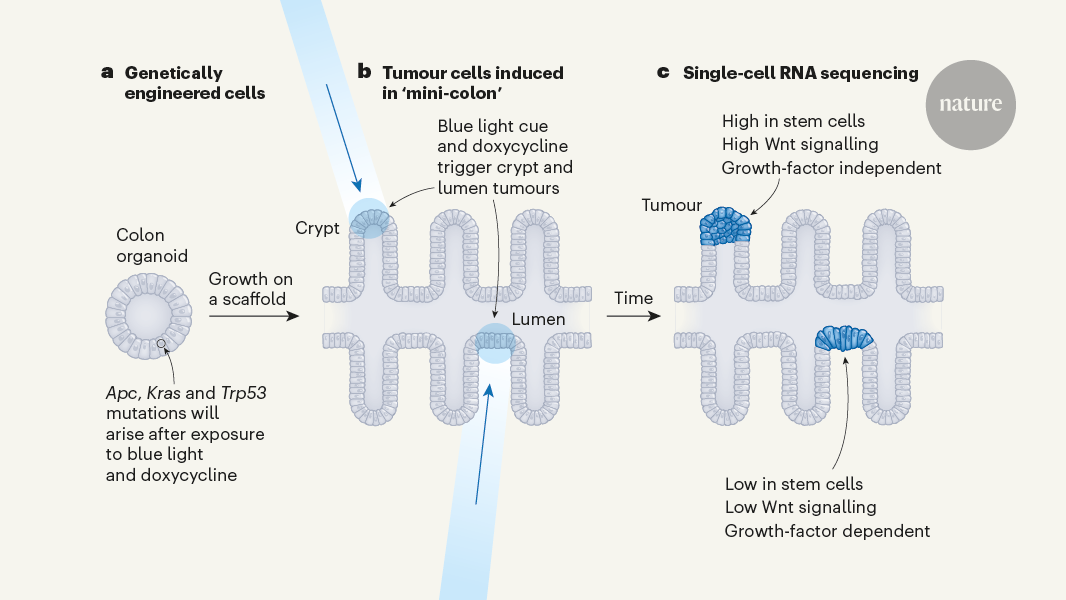Bioengineered Miniature Colons Provide Insights into Colon Cancer Progression
핵심 개념
Bioengineered miniature colons can provide valuable insights into the progression of colon cancer.
초록
The article discusses how advancements in technologies and models for investigating and monitoring tumor growth can lead to important biological insights and potentially pave the way for more effective clinical treatments. Specifically, the authors present a system for examining colon cancer using bioengineered "mini-colons".
The key highlights and insights from the article are:
- Improvements in technologies and models for studying tumor growth can provide valuable biological insights and potentially lead to the development of more effective clinical treatments.
- The authors have developed a system using bioengineered "mini-colons" to examine colon cancer progression.
- These miniature colon models can serve as a powerful tool for gaining a better understanding of the complex mechanisms underlying colon cancer development and progression.
- The use of bioengineered mini-colons allows for more controlled and detailed investigations compared to traditional animal models, potentially leading to new discoveries.
- The article suggests that this innovative approach using bioengineered mini-colons can shed light on the intricate processes involved in colon cancer and pave the way for the development of more effective clinical interventions.
요약 맞춤 설정
AI로 다시 쓰기
인용 생성
소스 번역
다른 언어로
마인드맵 생성
소스 콘텐츠 기반
소스 방문
www.nature.com
Bioengineered ‘mini-colons’ shed light on cancer progression
통계
No specific metrics or important figures were provided in the given content.
인용구
No direct quotes were provided in the given content.

더 깊은 질문
How can the insights gained from bioengineered mini-colons be translated into the development of new therapeutic strategies for colon cancer?
The insights gained from bioengineered mini-colons can significantly impact the development of new therapeutic strategies for colon cancer by providing a more accurate and representative model of the disease. These miniature organ systems can mimic the complex microenvironment of the colon, allowing researchers to study tumor growth, progression, and response to treatments in a more physiologically relevant setting. By analyzing the behavior of cancer cells within these mini-colons, researchers can identify key molecular pathways, biomarkers, and drug targets that are crucial for the development and progression of colon cancer. This knowledge can then be translated into the design of targeted therapies that specifically disrupt these pathways, leading to more effective and personalized treatment options for patients with colon cancer.
What are the potential limitations or challenges in using bioengineered mini-colons compared to traditional animal models, and how can these be addressed?
While bioengineered mini-colons offer numerous advantages over traditional animal models, such as increased relevance to human biology and the ability to study patient-specific responses, they also come with certain limitations and challenges. One key limitation is the lack of immune system components in these mini-organ systems, which play a crucial role in tumor development and response to therapy. Additionally, the scalability and reproducibility of bioengineered mini-colons may pose challenges in large-scale drug screening and testing. To address these limitations, researchers can explore co-culture systems that incorporate immune cells to better mimic the tumor microenvironment. Furthermore, advancements in bioengineering techniques, such as organ-on-a-chip technology, can enhance the scalability and reproducibility of mini-organ systems, making them more suitable for high-throughput drug screening and personalized medicine applications.
What other types of cancer or disease models could benefit from the use of bioengineered miniature organ systems, and how might this approach be expanded to other areas of biomedical research?
The use of bioengineered miniature organ systems can benefit a wide range of cancer types and disease models beyond colon cancer. For example, bioengineered mini-livers can be utilized to study liver cancer and drug metabolism, while mini-brain organoids can be employed to investigate neurological disorders such as Alzheimer's disease and Parkinson's disease. Furthermore, bioengineered miniature organ systems can be expanded to model complex multi-organ interactions, such as the gut-liver axis or the brain-gut axis, to study diseases that involve multiple organ systems. This approach can also be extended to drug toxicity testing, personalized medicine, and regenerative medicine applications, offering a versatile platform for advancing various areas of biomedical research.
0
